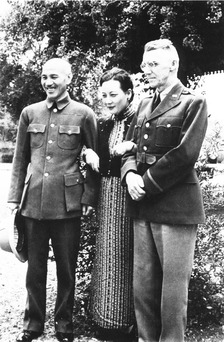|
A certain grammar point in Korean means “I’ve heard that_____; [Is that true?]” (____다던데 [정말 그래요]?). The Chinese next to me (B.B. Lee, born circa 1991) asked me a question about fast food. I asked him something that’s been on my mind for a while (see also post-#244): “I’ve heard that the Chinese dislike Chiang Kai Shek; is that true?“ (중국사람들은 [대만의 옛날 대통령] 장제스을 싫어하는 편이라던데 정말이에요?). I looked up this name in Chinese and showed him. Let me try to describe what he did: Half grin, half shrug, and a shake of the head. In words: “Ahh, No (that’s not the case).” I don’t make a point of asking people about this, but this happens to be the fourth Chinese who has independently told to me there was no ill will toward the man who was the biggest single enemy of Chinese Communism from the 1930s-1970s.
Another time, a certain female Chinese student (Y.J. Tang) asked me about famous American singers. In reply I asked “Who is best Chinese singer?” I asked this in English. (This Y.J. Tang is one of the only PRC Chinese who will use English.) Her answer was “Jay Zhou”.
|
|
Who is Jay Zhou? I had no idea. It turns out he’s from Taiwan. The best “Chinese” singer is from Taiwan? I am wise enough to things to not pursue these things. You are never to mention the “Three T’s” — “Tiananmen, Taiwan, Tibet” — to a Chinese in China. I am not in China, but I am in a 90%-Chinese environment, so I follow the rule anyway.
There is an irony to this. Jay Zhou’s grandfather, from what I see online, fled to Taiwan from China in the 1940s, so Jay Zhou is likely one of the millions of descendants of anti-Communist refugees from China who took over Taiwan following the humiliating total defeat of U.S.-supported Chiang Kai Shek’s (inept and corrupt) forces in 1949 and the ascendancy of the original Maoists in China around Mao himself. As far as I know, General Chiang’s dream was of a capitalist or state-capitalist,Confucian, conservative, assertive China — an authoritarian system, but not one of wild social experiments like those of the reckless Chairman Mao and all other Maoists (e.g. 1970s Cambodia). As far as I know, Chiang opposed in principle multiparty liberal democracy — Taiwan was a one-party state as long as he lived and longer. Mao’s grinning visage may be on their currency, their ruling party may call itself “Communist”, but you realize that China hasn’t been Maoist or even “Communist” much at all for decades. You realize that, ironically, the China that exists in the mid-2010s is much, much closer to Chiang’s dream than to Mao’s. It would be too difficult, cumbersome, inconvenient, and even self-defeating for PRC China to maintain some kind of anti-Chiang torch when it’s obviously his system that’s won the day. This can be an example of a people’s historical memory reversing itself totally over a period of thirty to forty years. I’m trying to think of a parallel in the West but I can’t. |

